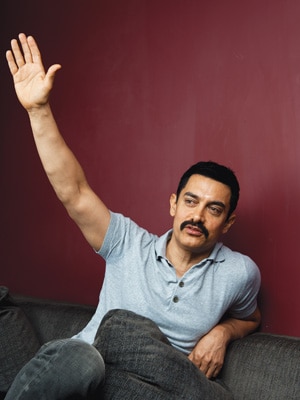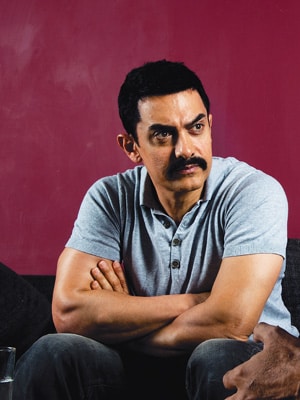
Aamir Khan - No Cuts. Only Rushes
Actor Aamir Khan talks about why he is a producer, how he deals with pain and the award functions that he does attend
Aamir Khan
Profile:
Actor, filmmaker, producer
He Says:
• Do what makes you happy; don’t worry about being successful.… Be courageous.… Live life on your terms.
• When you go through loss, personal or professional, I feel it is very important to mourn that loss.
Aamir Khan was all of 17 when he informed his parents that it made no sense for him to continue studying science, commerce or anything else, when he knew that he was to spend his life in the film industry. Even though his family had a strong film industry background, they were understandably upset and tried their best to get him to change his mind.
The young Aamir started his real acting career with Qayamat se Qayamat Tak and soon became a rage in Bollywood. Over the years, he evolved as an artist, rendering a whole host of characters.
In the process, Aamir sought to change the mores of middle-class Indian parents to let their children follow their own path.
At 46, the man is original, intense, spontaneous and wise beyond his years. Yet, he connects with today’s twenty-something generation with an ease that both older and younger heroes envy.
My daughter Niti is 26. She tells me she has been swooning over Aamir Khan ever since she was five. “Because he is no ordinary movie star. He is a filmmaker. [and not a moviemaker]. People don’t always make a distinction, but very often ‘film’ is more elevated, more intellectual, and of lasting value.… It’s not just a difference between being serious and comedic, because there are definitely lots of films that are comic and movies that are serious. Do you even get it, dad?” she asks me. She is nervous that I might even mess up the interview.
So here I am with Forbes India’s photo editor Dinesh Krishnan on a Sunday morning at Aamir Khan’s very ordinary looking apartment at Pali Hill in Bandra, Mumbai, to learn what enables Aamir to steal my daughter’s heart. He gazes away from me and looks at nothingness.
Then the man speaks: “Do what makes you happy; don’t worry about being successful.”
 Pause.
Pause.
“Be courageous.”
Pause.
“Live life on your terms.”
The interview could well end on that note. But I have barely gotten started. I want to know how much of him is actor, professional and entrepreneur.
He looks surprised at the suggestion that he could be a businessman, an entrepreneur.
I remind him that Aamir Khan Productions is the hot new name in town with six great releases under its belt. It is like no other production house because of its approach to quality, innovation and brand that create commercially successful films. And that means films that make money without asking you to park your brain outside the multiplex.
“I do not see myself as a businessman; I never wanted to be a producer. I was very clear about that. Everything changed with Lagaan,” he says.
“For two years, Ashutosh Gowariker was going around showing the script. People would confuse ‘lagaan’ with ‘lagam’ and ‘lagan’. I had to explain what the word meant. ‘Lagaan, lagaan, as in, rent,’ I would say.
“No one wanted to act in it. No one wanted to produce it. In India, there was no evidence of success for a sports film, no penchant for historicals. So, finally, I decided to produce it myself.
“Even if other producers would have agreed to do a film like Lagaan, they would have done so because of me; I knew they would not have their heart in it. They would get fair-skinned Indian actors and make them wear blonde wigs.”
Lagaan went where no Indian film had gone before and with it, the reluctant businessman who had just started his production house began changing the way films would be researched, produced and released in the future.
In 3 Idiots, the marketing campaign was path-breaking. In keeping with the mystique of the film’s protagonist, who vanishes into thin air, the production team decided that Aamir would do a vanishing act before the film was to be released, that he would take the country’s media on a nationwide ‘Aamir chase’.
The day the film was presented to them, the media waited for Aamir to show up. Instead, a video recording of the actor told them, “I am going away. Find me if you can. I will be somewhere out there, in disguise. I could be the man sitting next to you on a bus someplace, but I am gone…. here is a clue: I am going to where my mother came from.” So, they all rushed to Pune where another clue took them to Sachin Tendulkar’s house, and so on and on. For weeks, Aamir went around the country in disguise, sometimes watching a rural wedding as a bystander, sometimes travelling in an auto-rickshaw, somewhere having tea with the mohalla folks. At the end, he would reveal his identity and quickly move to the next place.
Everywhere he went, he played truant with the local press. In Benares, he sent the media sweets with a note, “I was here,” and the press went looking for all the folks whom Aamir had befriended and left with a farewell gift: A small golden medallion with the letters “AK” inscribed on it. The medallion was their pass to the premiere of the film.
Aamir Khan Productions did some more smart work. Their research showed that in the hinterlands of India, it was the regional film that grossed double the money a Hindi film did. So, Aamir Khan Productions had the entire student population mapped all over India and he travelled from Gujarat to Bengal, to Chandigarh. In every place, he gave interviews to regional newspapers and television, which made front-page news. The movie was a hit before it was screened.
Historian Ram Guha once told me the importance of not being distracted in building a professional career. There was a time when journalists would call him for his comments on anything and everything. Ram would simply decline. A professional must know that becoming a talking head could keep him in current view, but does so just for today and at a huge personal price.
Another such man, I find, is Aamir Khan. And distractions sometimes include some serious branding opportunity!
One such was an invitation from Madame Tussauds to pose for his wax replica. Aamir turned it down.
“I do not compromise who I am, what I am. This is how I conduct my life. That automatically has an emotional response and connects me with people. I do not design an image of myself.”
So, Aamir would rather focus on getting the script better, the shot perfect and the focus group feedback intently listened to by his team before the release of his film than “design an image” for himself.
We change gears, but I am still on the subject of distractions — the ones caused by private pain. I want to know, how do you compartmentalise pain and stay focussed?

“When I feel pain, whether personal or professional, I don’t brush it aside. When you go through loss, personal or professional, I feel it is very important to mourn that loss. So, if I lose a relationship, or something dramatically unfortunate or sad happens in my life, I put everything aside and I only concentrate on that because unless I am healed, I will not be able to move ahead.
“When my film does not do well, I sit and cry for two, three days,” he says. “Only when you accept that you failed, can you come to terms with it and learn from it.
“I was married to Reena for 16 years and then we went through a separation and divorce. The first thing I did was to stop working. I knew that I had to be with my children. I wanted to introspect about what had happened to me and my life, and where I am headed.
“If I had not done that, I would not have been in a position to conduct my life in the way I conduct it today and start all over again.… I think the healing process is very important. If you don’t spend time healing, you won’t heal properly,” he says.
In my world, the one of businessmen, entrepreneurs and professional employees, we are obsessed with the idea of rewards and recognition.
(This story appears in the 30 November, -0001 issue of Forbes India. To visit our Archives, click here.)






